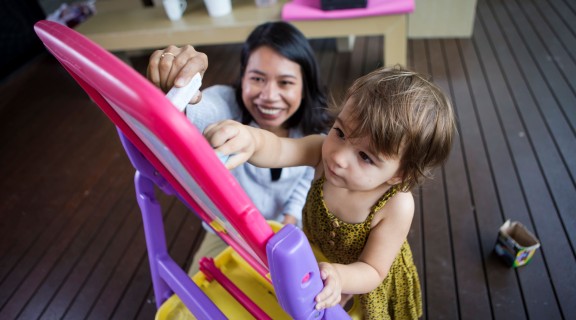
Magic Writing
15 March 2022 | State Library of Queensland
Children learn to write and spell at different ages, but Magic Writing can begin any time after a child has learned to talk!
Children love to play and imitate. They’ll pretend to cook, clean, wash the baby, read, and write. Have you noticed that when your child pretends to drive a bus or make a pizza, we rarely feel an urge to correct them on how they are doing it? On the other hand, when a child begins learning to write, sometimes we feel we must correct their spelling or letter shapes from the get-go.
Some guidance and teaching certainly is needed for your child to learn to write, but in the early years it is just as important that your child sees reading and writing as fun and creative, and something they can do independently.
Enter: Magic Writing. Magic Writing is where young children or beginner writers make marks, scribbles and possibly some letter shapes on a page and tell you they’ve just written your shopping list, a letter to Grandma or a chapter book. It’s magic because only they can read it!
While these letters and words are probably illegible, it doesn’t matter. Tell them, “You’ve just done Magic Writing! I can’t read it because it’s magic, and only you can tell me what it says.”
This is an exciting milestone that means your child is beginning to understand that text and print have meaning. Later, they will draw on this foundation when learning how to write conventionally.
Here are some ways to best support your child through the Magic Writing phase:
Modelling
Modelling is the best instruction you can give in the early years. Make their name using playdoh, ask your child to tell you about their drawing and write it down, add signs to your shop or train track. All this exposure will assist in your child's grasp and understanding of written language.
Opportunity
Have easy grip crayons and blank paper accessible for your little one to write with. You can even write some letter shapes during messy play with shaving foam or finger paint on the kitchen bench.
Take play seriously
Take your child’s shopping list to the supermarket, post that letter to Grandma or add their book to the bookshelf. This is how children learn that words are powerful and have meaning, and that their work is valued and important.
Writing is another form of creative expression and creative activities have many benefits including developing independence, confidence and problem solving. Most importantly, it allows your child to tap into the magic of their own imaginations—which is what being a child is all about!
Comments
Your email address will not be published.
We welcome relevant, respectful comments.